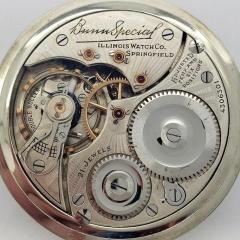-
Recently Browsing
- No registered users viewing this page.
-
Topics
-
Posts
-
The cannon pinion (be it conventional style or what you see in this movement) should slip on its arbour so the hands can be set independently without affecting the gear train. If there is too much friction between the cannon pinion and the second wheel, turning the hands to set them backwards can sometimes force the escape wheel teeth to overrun the pallet stones, creating the behaviour you describe. The train is running in reverse when this happens. This can often chip the pallet stones. I’d say at least half of the watches I’ve inspected with very tight cannon pinions had chipped pallet stones. Hopefully this isn’t the case with your watch. I’m not familiar with this movement but you need to get the friction in the cannon pinion adjusted correctly. Hope this helps, Mark
-
Pallet fork was in. I’d had the movement running ok, and only removed the balance to flip it over and install the keyless works and date mechanism. The pallet fork wasn’t locking the gear train when hand setting - it was oscillating as the escape wheel rotated. This may have been in one direction only - can’t remember.
-
By watchweasol · Posted
Hi Find attached parts/repair notes for the JLC 911, might be useful. JLC_JLC 910, 911.pdf JLC_JLC 910, 911 Repair Notes.pdf -
By watchweasol · Posted
Hello and welcome to the forum Dan. Used to know Middlesboro quite well, that was twenty years plus ago. Attached a little reading to get you started. TZIllustratedGlossary.pdf -
for the most part no. Each individual watchmaker and/or shop had their own system. One of the shops I worked at basically had a reference to a page number in a book. then there are some shops that do no markings at all as they keep their records on a computer and they don't have to mark the watch. Usually if somebody is marking and they've service the watch before you'll see those next to each other. then as far as anything resembling a standard goes at one time the American watch and clockmakers Institute assigned all of their members a number. but that was a very long time ago and I doubt that they are using it anymore.
-






Recommended Posts